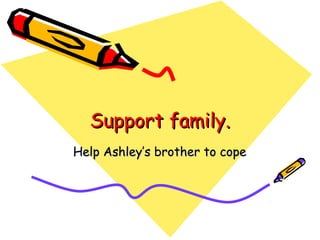Support family
- 1. Support family. Help Ashley’s brother to cope
- 2. Siblings of children with special needs • Siblings of children with special needs might be • scared of sibling and anxious about own health “Will I be contaminated?”. • Angry, aggressive and jealous. • Embarrased and feel guilty. He can’t interact with his friends and invite them. • Sad, depressed, frustrated. He was waiting for a sibling, but she has special needs. • Lonely. Parents are busy taking care of his sister. • Stressed. Family life has totally changed. Information retrieved from http://raisingchildren.net.au/articles/disabilities_helping_siblings.html
- 3. Talk about feelings • Ashley’s family, especially 12 years old brother is struggling with Ashley’s special needs. • Share and talk about feelings. Let him know that it is Ok to feel the way he does. • Talk about Ashley’s diagnosis, cause and effects. What are expectations. What might happen in future. • Talk about how to respond to www.microsoftword other people’s reactions. clipart • Share information with teachers at school.
- 4. Set fair family rules and responsibilities • Older brother might feel that he is neglected by parents. Therefore, do not ignore him. • Explain him what, how and why family members are doing and will do. Involve him in taking care and interactions with Ashley. • Set fair and appropriate rules and responsibilities in the family. Since some individuals with Angelman Syndrome can carry out some household chores, let Ashley tidy up her toys. Her brother may remind her to clean up and supervise while she is tidying up. • Set same behavioural expectations for everyone. For example, aggressive or hurtful behaviour is not accepted from any child in family. • Brother can be responsible for taking care of communication devices – change pictures, record words or semtences.
- 5. Get help from other resources • Give him own space at home where he can stay alone when he wants. • If it seems that he is still struggling to cope then: • Get help from professionals how to interact with Ashley. For example, speech and language pathologist can explain how to communicate with Ashley, how to use communication devices. • Other family members might help with advice, listen and support. • Families with children with Angelman Syndrome can help to understand special needs, teach coping strategies and accept situation as normal. Information retrieved from http://raisingchildren.net.au/articles/disabilities_helping_siblings.html
- 6. Get help from other resources • Give him own space at home where he can stay alone when he wants. • If it seems that he is still struggling to cope then: • Get help from professionals how to interact with Ashley. For example, speech and language pathologist can explain how to communicate with Ashley, how to use communication devices. • Other family members might help with advice, listen and support. • Families with children with Angelman Syndrome can help to understand special needs, teach coping strategies and accept situation as normal. Information retrieved from http://raisingchildren.net.au/articles/disabilities_helping_siblings.html
